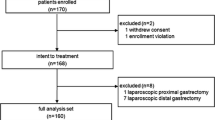Abstract
Minimal-invasive gastrectomy has been established as commonly used method for the early gastric cancer in Korea and Japan. From the first laparoscopic cancer gastrectomy in 1992 in Japan, numerous prospective randomized trials from these two countries have gained the evidence for non-inferiority or even specific benefits compared to open surgery. In Korea, the “Korean Laparoscopic Gastrointestinal Surgical Study Group” (KLASS group) founded, in 2004, successfully gained evidence not only in regards of oncological safety of laparoscopic gastrectomy, but also for the impact of different reconstruction methods and alternative extents of luminal resection on postoperative outcome and quality of life. Awaited results of latest studies from Korea, Japan, and China may suggest laparoscopic approaches as an option even in advanced gastric cancers. These studies could potentially be the starting point to find the role of laparoscopic gastrectomy in the west, where the incidence of gastric cancer is rather lower; the cancers are mostly diagnosed in advanced stages, and often, a perioperative chemotherapy is applied. Robotic (-assisted) gastrectomy was not shown to be superior to laparoscopic resection in Korea, but new technological developments should continuously be evaluated in clinical trials regarding a potentially favorable learning curve, which might play a key role in regards of the limited case load per center of gastric cancer in the west. This review summarizes the history of laparoscopic cancer gastrectomy in Asia and points out the important steps of establishing a nation-wide scientific network to support the surgical routine by the necessary evidence with a focus on Korea.
Similar content being viewed by others
References
WHO (2012) Globocan 2012—home. Globocan 2012. http://globocan.iarc.fr/Default.aspx
Rugge M, Fassan M, Graham DY (2015) Epidemiology of gastric cancer. In: Strong VE (ed) Gastric cancer: principles and practice. Springer, Cham, pp 23–34
Karimi P, Islami F, Anandasabapathy S, Freedman ND, Kamangar F (2014) Gastric cancer: descriptive epidemiology, risk factors, screening, and prevention. Cancer Epidemiol Biomark Prev 23(5):700–713
Kitano S, Iso Y, Moriyama M, Sugimachi K (1994) Laparoscopy-assisted Billroth I gastrectomy. Surg Laparosc Endosc 4(2):146–148
Japanese Gastric Cancer Association (2017) Japanese gastric cancer treatment guidelines 2014 (ver. 4). Gastric Cancer 20(1):1–19
Kim HI, Hur H, Kim YN, Lee HJ, Kim MC, Han SU et al (2014) Standardization of D2 lymphadenectomy and surgical quality control (KLASS-02-QC): a prospective, observational, multicenter study [NCT01283893]. BMC Cancer 14(1):209
Kim W, Kim HH, Han SU, Kim MC, Hyung WJ, Ryu SW et al (2016) Decreased morbidity of laparoscopic distal gastrectomy compared with open distal gastrectomy for stage I gastric cancer: short-term outcomes from a multicenter randomized controlled trial (KLASS-01). Ann Surg 263(1):28–35
Kim H-H, Han SU, Kim M-C, Kim W, Lee H-J, Ryu SW et al (2016) Long-term outcomes of laparoscopic distal gastrectomy compared with open distal gastrectomy for clinical stage I gastric adenocarcinoma (KLASS-01): a multi-center prospective randomized controlled trial. J Clin Oncol 34(suppl; abstr 4060)
Katai H, Mizusawa J, Katayama H, Takagi M, Yoshikawa T, Fukagawa T et al (2017) Short-term surgical outcomes from a phase III study of laparoscopy-assisted versus open distal gastrectomy with nodal dissection for clinical stage IA/IB gastric cancer: Japan Clinical Oncology Group Study JCOG0912. Gastric Cancer 20(4):699–708
Inaki N, Etoh T, Ohyama T, Uchiyama K, Katada N, Koeda K et al (2015) A multi-institutional, prospective, phase II feasibility study of laparoscopy-assisted distal gastrectomy with D2 lymph node dissection for locally advanced gastric cancer (JLSSG0901). World J Surg 39(11):2734–2741
Lee H-J, Hyung WJ, Yang H-K, Han SU, Park Y-K, An JY et al (2016) Decreased morbidity of laparoscopic distal gastrectomy with D2 lymphadenectomy compared with open distal gastrectomy for locally advanced gastric cancer: Short term outcomes from multicenter randomized controlled trial (KLASS-02). J Clin Oncol 34(suppl; abstr 4062)
Park JY, Kim YW, Ryu KW, Nam BH, Lee YJ, Jeong SH et al (2016) Assessment of laparoscopic stomach preserving surgery with sentinel basin dissection versus standard gastrectomy with lymphadenectomy in early gastric cancer-A multicenter randomized phase III clinical trial (SENORITA trial) protocol. BMC Cancer 16(1):340
Lee YJ, Jeong SH, Hur H, Han SU, Min JS, An JY et al (2015) Prospective multicenter feasibility study of laparoscopic sentinel basin dissection for organ preserving surgery in gastric cancer: quality control study for surgical standardization prior to phase III trial. Med (United States) 94(43):1894
Ryu KW, Kim YW, Min JS, Yoon HM, An JY, Eom BW et al (2017) Results of interim analysis of the multicenter randomized phase III SENORITA trial of laparoscopic sentinel node oriented, stomach-preserving surgery versus laparoscopic standard gastrectomy with lymph node dissection in early gastric cancer. J Clin Oncol 35(suppl; abstr 4028)
Lee J-H (2016) Ongoing surgical clinical trials on minimally invasive surgery for gastric cancer: Korea. Transl Gastroenterol Hepatol 1:40
Hu Y, Huang C, Sun Y, Su X, Cao H, Hu J et al (2016) Morbidity and mortality of laparoscopic versus open D2 distal gastrectomy for advanced gastric cancer: a randomized controlled trial. J Clin Oncol 34(12):1350–1357
Kim H-I, Han S-U, Yang H-K, Kim Y-W, Lee H-J, Ryu KW et al (2016) Multicenter prospective comparative study of robotic versus laparoscopic gastrectomy for gastric adenocarcinoma. Ann Surg 263(1):103–109
Park JM, Kim HI, Han SU, Yang HK, Kim YW, Lee HJ et al (2016) Who may benefit from robotic gastrectomy?: a subgroup analysis of multicenter prospective comparative study data on robotic versus laparoscopic gastrectomy. Eur J Surg Oncol 42(12):1944–1949
Acknowledgements
Felix Berlth is supported by the “German Research Foundation” (DFG).
Author information
Authors and Affiliations
Corresponding author
Ethics declarations
Conflict of interest
The authors declare that they have no competing interests.
Research involving human participants and/or animals
This article does not contain any studies with human participants or animals performed by any of the authors.
Informed consent
For this type of study formal consent is not required.
Additional information
The article is part of topical collection on Gastric Cancer Surgery.
Rights and permissions
About this article
Cite this article
Berlth, F., Yang, HK. Minimal-invasive gastrectomy: what the west can learn from the east?. Updates Surg 70, 181–187 (2018). https://doi.org/10.1007/s13304-018-0547-z
Received:
Accepted:
Published:
Issue Date:
DOI: https://doi.org/10.1007/s13304-018-0547-z




